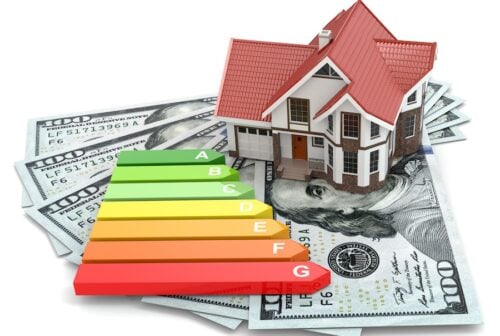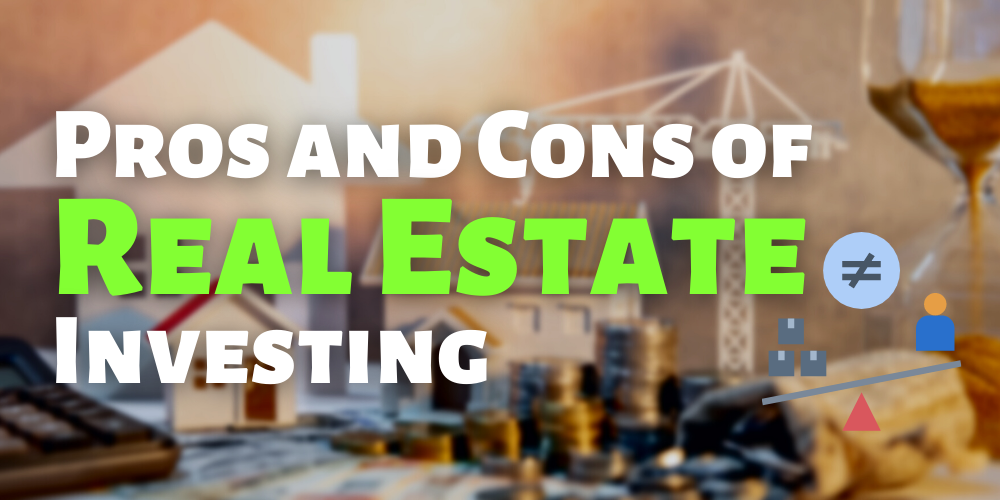There is no doubt that real estate investing can be a very profitable venture. However, like with any type of investment, real estate investing has pros and cons to consider before getting started.
In this article, we will look at some of the pros and cons of real estate investing, as well as some tips on getting started.

Pros of Real Estate Investment
Investing in real estate is a smart move for all sorts of reasons. Have you ever considered why it’s such an attractive investment? For starters, property appreciation seems pretty straightforward, at least if history repeating itself is any indication! Here are the main pros that make this type of deal worthwhile:
1. Real estate Appreciates
The housing market bubble burst in 2007, subsequently rebounded in 2013, and we are seeing skyrocketing prices now. Historically, real estate has appreciated over time.
On average, real estate investors could see their investment appreciate at a rate between 3.5% and 8% annually.
Real estate is a valuable tangible asset that will always have a monetary value. Your investment may not suffer if there’s an economic downturn or crash; it might even grow due to fluctuations within different markets!
By investing in real estate, you are not just securing your financial future; with land titles comes immense value. Your $200K may drop to around 100k if the housing market crashes, but it will always be worth something!

3. Generates Steady Cash Inflows
When a property is currently being rented out, it generates steady cash inflows. The monthly rent payments can be substantial and additional expenses are associated with some properties such as washers or dryers that may need maintenance every so often.
4. Tax Benefits
The depreciation expenditure that may be deducted from a real estate investment does not result in any outflow of money, but nevertheless lowers taxable income, shielding you from having to pay tax on an increased amount.
Also, if your property is worth more now than when originally bought and taxed at its original rate of return, then it will be possible to avoid income tax for years by rolling those gains into other investments!

5. Real Estate Increases Your Net Worth
A house is a physical asset that you can see, touch, and live in. It’s also an investment property that will likely appreciate over time. The average home price has increased by more than inflation in the last century!
Paying down your mortgage each month partially pays you, since part of your payment goes towards the principal, which is the amount you originally borrowed. The longer you own your home, the more equity you’ll have in it. In other words, your net worth will increase as you pay off your mortgage!
6. Real Estate Income Increases Gradually
Your property’s earnings grow with inflation, giving you more money for each year that goes by. This is an advantage only if you avoid variable-rate mortgages, like interest rates on loans or lines of credit!
7. Real Estate Gives You Control
With real estate investing, you are in the driver’s seat. Not only can you mitigate risks and grow your portfolio much faster, but it also provides you with passive income that you manage.
Real estate investors are in charge of their success or failure. When looking for deals and managing rental markets, competition can be fierce, but with careful planning, it’s possible to find the best tenants who will increase income even more so than before!
Cons of Real Estate Investment
1. Real Estate Requires Money
You need a lot of money to get started in real estate investing. You’ll need enough for a down payment, closing costs, and reserves – which is the money you’ll need to keep paying the mortgage even if your property is vacant or needs repairs!
This can be difficult to come up with if you don’t have a lot of saved-up cash. You can try to get a loan from the bank, but they’ll often require collateral like another property or a high credit score.
You may be able to find creative financing options like partnering with another investor or using seller financing, but these can be difficult to come by and are often not as good of a deal as they seem.
In short, real estate investing requires a lot of money that you may not have easy access to.

2. It Takes a Lot of Work
While real estate can be a passive investment, it often requires a lot of work. You’ll need to screen tenants, collect rent, handle repairs, and deal with evictions, all of which can be time-consuming and stressful!
It’s also important to note that you must stay on top of the changing laws regarding landlord-tenant relationships. These laws vary from state to state, so you’ll need to do your research or hire a property manager who knows them well.
3. Real Estate Can Be Risky
Just like any other investment, real estate comes with a certain amount of risk. The value of your property can go up or down, and you could end up losing money if you’re not careful.
You could also end up in a bad situation if your tenant stops paying rent or damages your property. It’s important to have a solid lease agreement in place and to screen tenants carefully to minimize the risk of problems.
4. Real Estate Takes Time
It’s true that real estate appreciates, but usually, it takes years to see substantial increases.
Of course, you can avoid the wait by purchasing a home below cost and selling for profit; however, those properties are priced under market because they need extensive repairs or renovations, which costs money and time. Major improvements may require three-six months’ worth of progress reports before we get approval from owners.
Managing your real estate investments can be a time-consuming task, but the rewards are worth it.
You need to spend some of that valuable spare time learning how these work and managing them properly so you don’t lose money. On top of that, active management may take up all kinds of mental energy. Make sure this will fit into what’s going on with life right now before getting started.

5. Real Estate May Be Difficult To Deal With
Landlords are constantly looking for the best tenants. But what happens when they find one that isn’t so great? You could end up losing money and time spent on court cases to someone who doesn’t pay their bills or leaves it in very poor condition upon moving out.
In some states, like Maryland for example, the law is very tenant-friendly. You must take a non-paying tenant to court three times before they can be evicted from their property.
By now, you should have a good idea of the pros and cons of real estate investing. As with any investment, there are risks and rewards, but if you do your research and invest wisely, real estate can be a great way to build your wealth.
Strategies on How to Invest
If you’re interested in real estate investing, there are a few different ways to get started. You can buy a property outright, or you can invest in a real estate investment trust (REIT). REITs allow you to invest in commercial real estate without having to purchase a property outright.
There are also crowdfunding platforms that allow you to invest in real estate projects. These platforms allow you to pool your money with other investors and purchase a property or participate in a real estate development project.
Another option is to partner with an experienced real estate investor. This can be a great way to get started in real estate investing without having to put all the money down yourself. You can also learn from your partner and gain valuable experience in the industry.
No matter which strategy you choose, be sure to do your research and invest wisely.
Conclusion
So, is real estate investing for you? The answer to that question depends on a lot of different factors, including your personal financial situation, investment goals, and comfort level with risk.
But if you’re thinking about getting started in real estate investing, it’s important to know the pros and cons so you can make an informed decision
We hope this article has helped give you a better understanding of what to expect and how to get started. Are you ready to become a real estate investor?


 Tags:
Tags:










